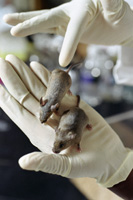Diabetes study at U.S. university advances
A transplant-free approach to curing Type 1 diabetes using medication has been reaffirmed in tests on mice, according to a Washington University study.

The study, published this week in the journal Science, shows that there is a period of time in mice after the onset of diabetes where drugs can stop the immune system from attacking all the insulin-producing cells in the pancreas.
"You have a window of time in humans, too," said Dr. Emil Unanue, the study's author and Washington University immunologist.
The study advances a transplant-free approach to curing Type 1 diabetes with a short and inexpensive drug treatment.
The research also rebuked Harvard University research from three years ago that said adding adult stem cell proteins from the spleen into the mouse pancreas could create new pancreatic cells.
Dr. Denise Faustman, author of the Harvard study in 2003, said she was excited about the research advancing.
She said introducing spleen cells could have provided the protein that helps kill T-cells and not created a new source pancreatic cells, as her study suggested.
As many as 3 million diabetes cases are Type 1, according to the Juvenile Diabetes Research Foundation.
Type 1 diabetes is commonly a juvenile disease where immune system T-cells kill insulin making pancreatic cells that control blood sugar levels.
Researchers hope medication can eliminate the need for pancreatic cell transplants that have been done on about 500 people and require long-term drug treatment, reports AP.
O.Ch.
Subscribe to Pravda.Ru Telegram channel, Facebook, RSS!


